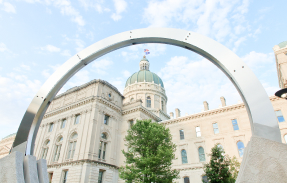
No matter how careful you are on the road, you can’t get ahead of every possible accident. If someone else chooses to behave negligently on the road, you may find yourself contending with the consequences of their recklessness. While you can’t control those parties, though, you can control how you react to a dangerous motorcycle accident.
More specifically, you can control what your long-term interactions with Indiana’s police officers look like. If you want your post-accident life to go smoothly, it’s in your best interest to remain at the scene of a motorcycle accident until the police arrive. Leaving before the police arrive can see you face felony charges, even if the accident didn’t injure anyone.
Did you leave the scene of a recent motorcycle accident, or did the person who hit you disappear into the night? Let theIndiana personal injury lawyers with Vaughan & Vaughan know. We can investigate your circumstances, interface with the police on your behalf, and help you get your life back on track again.
Why Might Parties Face Hit and Run Charges After a Motorcycle Accident?
Indiana residents have an obligation to report accidents that generate more than $1,000 in losses. The failure to report these accidents can see the injured parties face Class B misdemeanor charges for their refusal to comply with the law. In other words, if you get into a motorcycle accident, refusing to report that accident may see you face criminal charges.
Leaving the scene of a motorcycle accident before the police arrive complicates matters even further. If someone’s called the police, you need to wait until the police appear before you discuss leaving the scene. Failure to remain at the site of an accident can see you face hit and run charges, even if no one was injured in the crash.
Indiana’s hit and run charges constitute felony criminal charges in the eyes of the state’s courts. While you can work with an attorney to challenge accusations of a hit and run motorcycle accident, staying on the scene can mitigate the need to go to criminal court at all.
There is some good news, though. If the party liable for your accident leaves the scene before the police arrive, they may face criminal charges. You, in turn, can use a hit and run conviction as evidence of that party’s negligence in civil court.
Your Case Will Get
The Attention It Deserves

How to Protect Yourself After a Motorcycle Accident
There are steps you can take after a motorcycle accident that can do more than prevent you from facing criminal charges for perceived wrongs. These steps can also make it easier for you to assume a personal injury case against the party responsible for your accident, should you want to at a later point in time.
You can start by:
Contacting the Police
First and foremost, make sure that neither you nor your passenger, if you have one, have been injured by your crash. If your injuries are minor and one of you can call the police, do so. Your call will send emergency responders to your location, at which point you can get the medical care you need to recover from your accident.
If neither you, the liable party or a passenger can call the police, ask that someone in the general vicinity do so for you. There’s a good chance that a bystander will take action without prompting.
By contacting the police, you establish your presence at an accident scene as well as your willingness to comply with local laws. This puts you in a good position to protect yourself from accusations of fault, particularly if you remain on the scene.
Once emergency responders and police officers arrive, take the necessary steps to work with them. Do not admit to fault for the accident, but discuss the nature of your losses and any concerns you might have. If emergency responders recommend that you leave the scene to go and receive medical care elsewhere, do so, but only with their support.
Contacting a Motorcycle Accident Lawyer
Navigating the scene of a motorcycle accident can prove difficult, even if you’re not severely injured. You have to be careful about how you phrase certain statements, how you talk to the liable party, and how you speak with police officers. Even something as simple as an apology may be misconstrued as an admittance of fault.
How can you better contend with the stress of a motorcycle accident scene? Call on an attorney. You can reach out to Vaughan & Vaughan within minutes of your collision to secure on-the-scene representation. Our team can then interface with the liable party and police officers on your behalf.
Our Indiana motorcycle accident lawyers can take every possible measure to ensure that your experience immediately following a motorcycle accident is as productive and case-positive as possible.
Exercising Your Right to a Civil Lawsuit
So long as you stay at the scene of a motorcycle accident until the police arrive, you may retain your right to take legal action against the party responsible for your crash. You can discuss this right in more detail upon meeting with our motorcycle accident attorneys in Indiana.
There’s a chance that you can hold the liable party financially accountable for your recovery, depending on what evidence of fault you can bring forward. If you want to win that financial support, though, you need to file your motorcycle accident claim within Indiana’s personal injury statute of limitations.
Indiana Code section 34-11-2-4 gives you no more than two years to act on your losses. The sooner you call an attorney, the sooner you can begin compiling a case.
Vaughan & Vaughan Protects Motorcycle Accident Survivors
There are civil statutes in Indiana that give you certain rights after a motorcycle accident. These statutes can protect your right to legal action in the face of another party’s negligence. If you leave the scene of a motorcycle accident before the police arrive, though, you put your right to compensation and your driving record at risk.
When in doubt, stay at the scene of an accident until an authority figure gives you permission to leave. You can call on an Indiana motorcycle accident lawyer while you’re at the scene for consummate representation and, in the face of your shocking losses, legal guidance.
Vaughan & Vaughan can specifically connect with you shortly after your collision and manage your conversations with arriving officers. You can contact us by phone or through our website to learn more about the different ways our representation can benefit your recovery.




